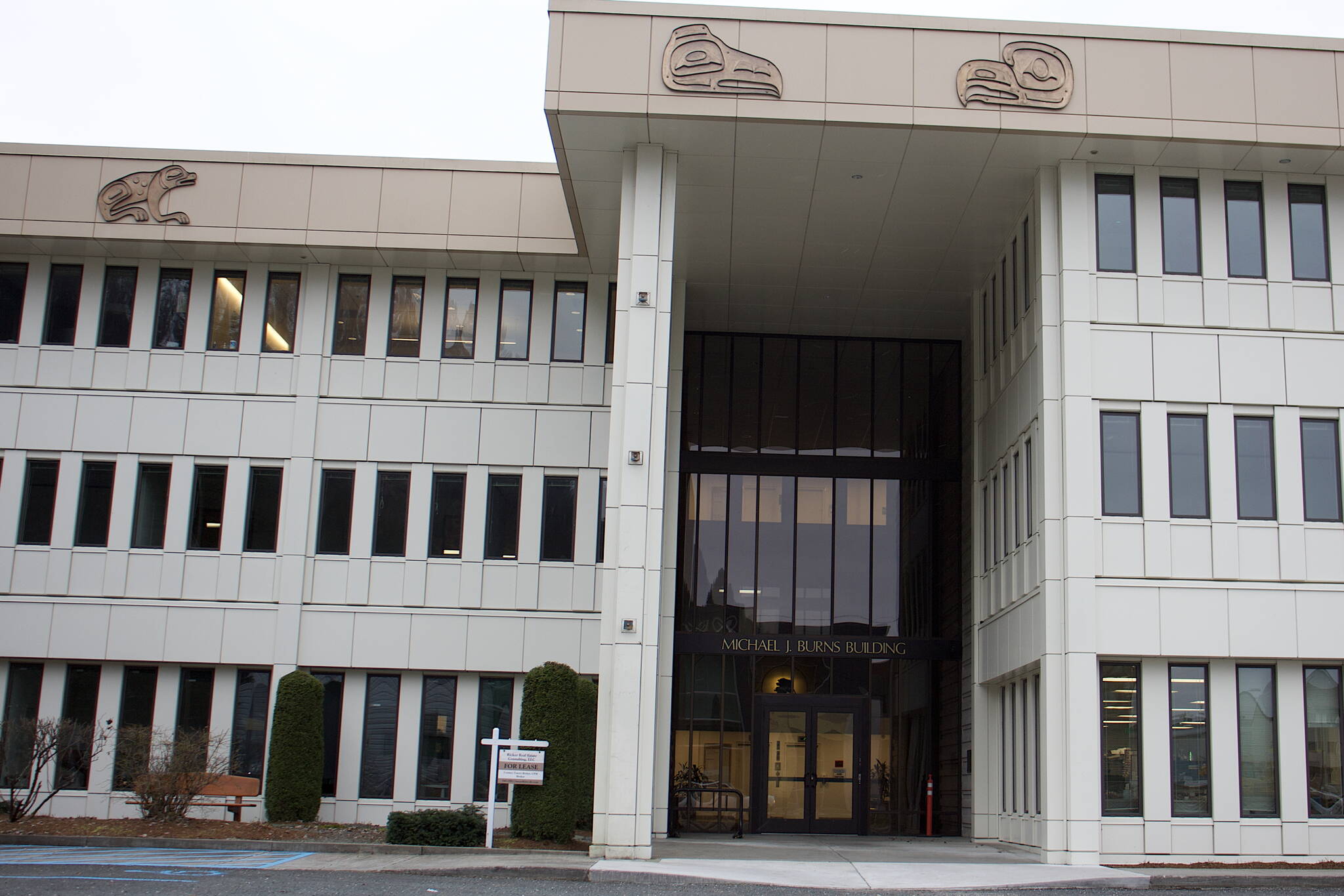Exploring options for moving some or all of Juneau’s municipal government offices to the Michael J. Burns Building where the Alaska Permanent Fund Corp. is currently headquartered got unanimous — if not entirely wholehearted — support from Juneau Assembly members meeting on Monday night.
A search for new office space for municipal employees was initiated by local leaders after voters last October rejected a bond measure to fund most of a new City Hall building, the second straight year such a measure failed to pass. City leaders have stated the current arrangement of employees scattered in five different downtown buildings is inefficient, costly to lease and some spaces are in need of critical repairs.
[City to yet again consider office space options after voters twice reject new City Hall]
The Burns building emerged as the best of three property officials were able to evaluate following a request last month by the City and Borough of Juneau seeking available space. The other two properties are the Bill Ray Center located across the street from the Burns building and lodging/commercial space at two adjacent addresses on Mendenhall Loop Road near Jackie Renninger Park.
Three options for relocating employees are being considered. One would move all 164 downtown employees and the Assembly Chambers, another would move about 100 employees while keeping the chambers and some employees at City Hall, and the third would move about 50 employees in the Marine View Building due to concerns about a lease expiring soon and building maintenance needs.
City Manager Katie Koester told the Assembly’s Committee of the Whole on Monday the available space in the Burns building is flexible enough for any of the relocation options. Furthermore, the other two properties would require major remodeling in comparison, and the Mendenhall Valley properties would be at odds with the city’s goal of maximizing housing since some of the space is used for that purpose.
Wade Bryson, an Assembly member who was among the strongest proponents for a new City Hall, said his preferred option is to move all of the involved city operations under one roof, based on the past couple of years of debate about the issue
“At no time did we say keeping the city offices separate would benefit anybody,” he said. “The conversation always came back to having all of the offices together is going to be the best way we’re going to be able to conduct business more efficiently.”
The 73,307-square-foot Burns building currently has 28,000 square feet available and is expected to have an additional 16,000 square feet available by July of 2025, which would be enough in total for all downtown municipal government functions, Koester said. There are also 157 parking spaces for tenants. The proposal submitted to the city is offering a starting lease rate of $2.90 and $3.10 per square foot.
The 22,000-square-foot Bill Ray Center also has a 38,000-square-foot parking lot, with the property owner suggesting a remodel of the current building and construction of a new 25,000-square-foot building over the parking lot to accommodate all city offices, Koester said. No specific square footage information is provided for the Mendenhall Valley properties and Koester said extensive evaluation would be needed to determine their use as office space.
Assembly members agreed they are comfortable at least considering leasing the Burns building. Koester is scheduled to bring back more detailed lease options based on her discussions with property managers at the Burns building during the Committee of the Whole’s next meeting on Feb. 26.
Concerns about leasing all facilities rather than being in city-owned space, and if that would result in a loss of control over things such as ensuring disability access and other requirements are met, were expressed by Assembly member Alicia Hughes-Skandijs. Koester acknowledged city ownership of its own facilities offers the most control and flexibility.
“However, the voters of the City and Borough of Juneau have told us — not once, but twice — that owning our facility is not an option that they’re ready to entertain at this time,” she said. “I think that the greatest concern I would have moving forward with the Burns building is cost because we would be purely at the mercy of the market, as we are today with our leased facilities so it’s not a risk that we are unfamiliar with.”
Some Assembly members asked what would happen to the current City Hall if municipal offices relocate. Koester said she didn’t have any plans for that scenario, although Deputy Mayor Michelle Bonnet Hale said she favors moving all of the existing offices so the building can be sold.
“I think we should sell this building because we’ll make some money,” she said. “It’s waterfront property. It might have a lot of problems, but I think we should sell this building because then we could use that to offset some of those rent costs.”
• Contact Mark Sabbatini at mark.sabbatini@juneauempire.com or (907) 957-2306.

